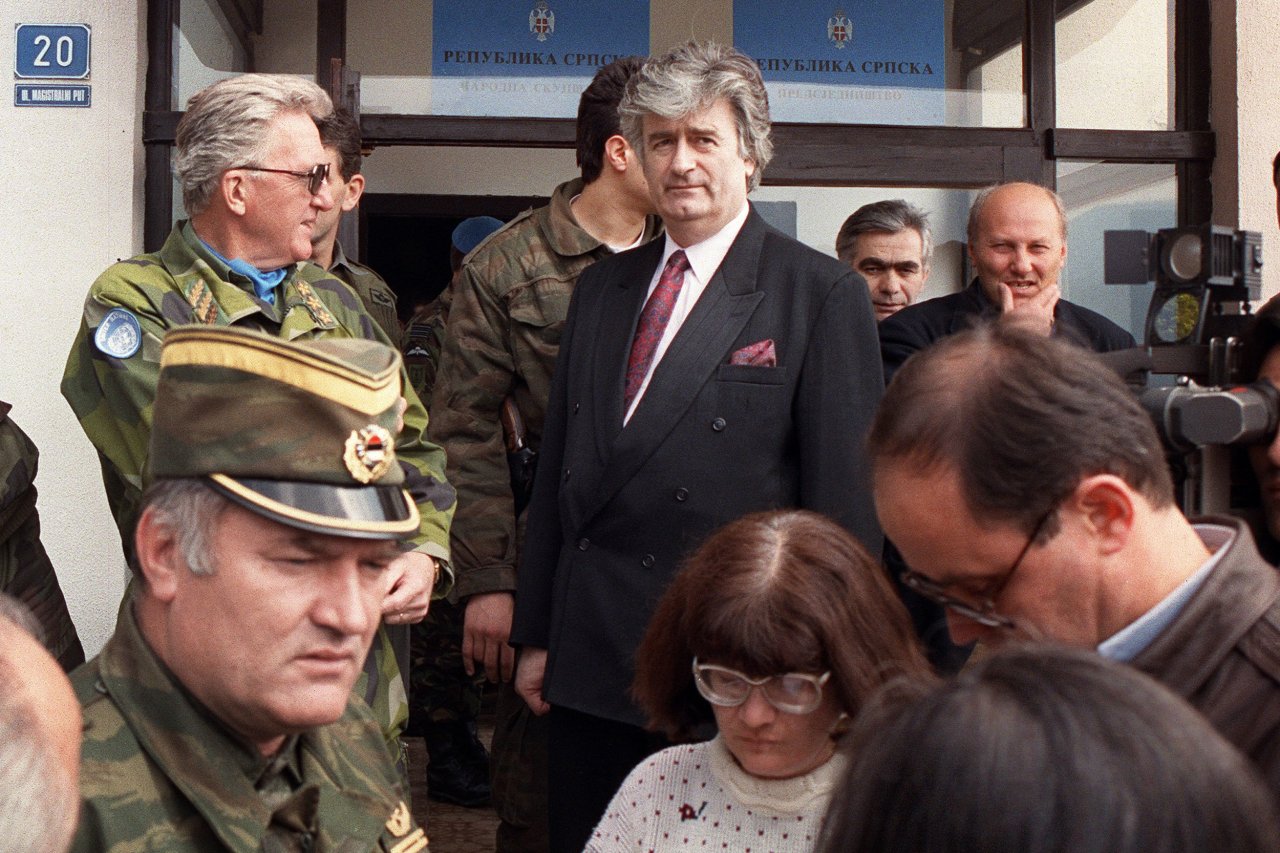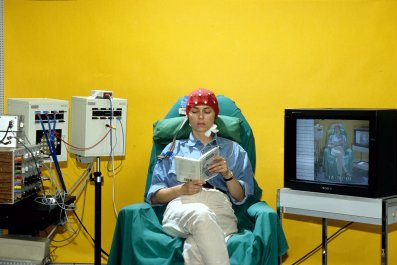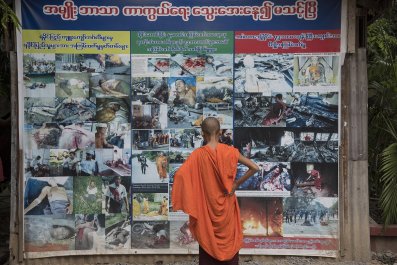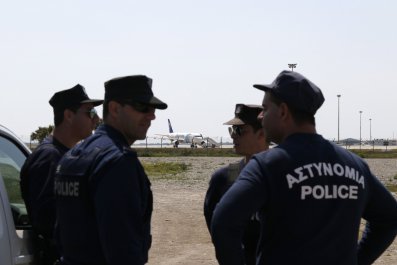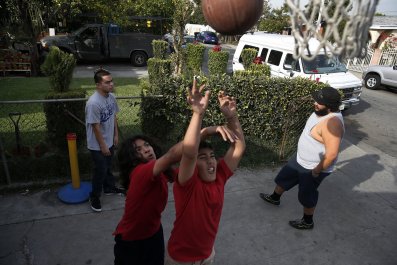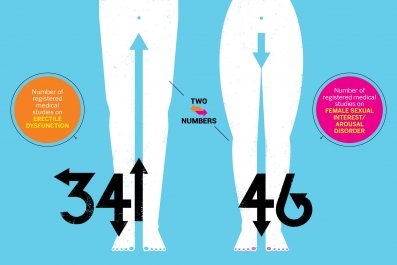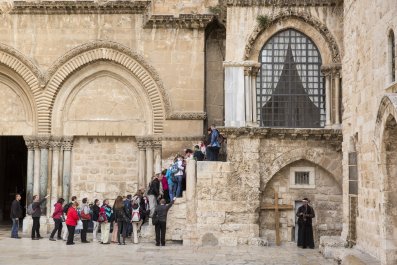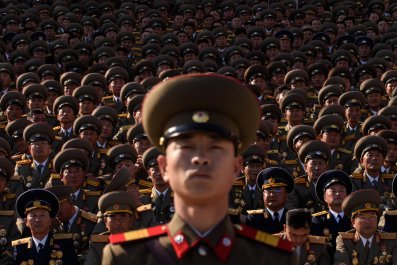Updated | The voice at the other end of the radio was small and desperate. "In the name of God, do something," the Bosnian Muslim commander inside the embattled enclave of Srebrenica said, his voice cracking as he held back tears. "We are dying here."
That was the bitter winter of 1993, and I was sitting inside the freezing Bosnian presidency building in Sarajevo, speaking to him on a ham radio. There had been no electricity, no heat, no water and no humanitarian aid for weeks in Sarajevo, which was being pummeled by mortars and rockets. The wild dogs running through the streets and the people dodging sniper bullets made it seem like an apocalyptic city. Everyone I knew was starving, and many were dying.
Srebrenica, a former mining town and a United Nations "safe haven," appeared to be on the verge of falling to forces led by General Ratko Mladic, under a plan masterminded by Bosnian Serb leader Radovan Karadzic. A poet and former psychiatrist, Karadzic attended Columbia and Sarajevo universities, an intellect who became known as the Butcher of Bosnia. He had once lived in Sarajevo, but he was now intent on razing it. The terrified population huddled inside their homes, sustaining shelling and bombardment that would drive anyone to the point of madness.
No one who witnessed the war in Bosnia came out of it untouched, and it would be hard to find someone there today whose life was not affected by the master plan of Karadzic and his henchmen. In March, a U.N. tribunal in The Hague found Karadzic guilty on 10 out of 11 counts of war crimes, including genocide, crimes against humanity and other atrocities. One of the counts of genocide was related to the Srebrenica massacre, the most notorious of the war. The trial lasted nearly five years, and Karadzic was sentenced to 40 years for his brutality. He will most likely appeal.
Survivors came forward during the trial to give accounts of what they saw and endured. If I had not been there during the war, I would not have believed some of the stories of what happened. A Muslim-Serb couple who snuck away to get married were killed as they ran hand in hand over a bridge separating front lines. They were later renamed "the Romeo and Juliet of Sarajevo." The city parks were stripped bare of wood so that people could make fires to survive the intense cold. A soccer field became a crowded cemetery, with most of the headstones showing dates of birth in the 1990s.
In the Bosnian town of Foca, the Serbian army established "rape camps." Bosnian Muslim women were violated dozens of times a day with the purpose of impregnating them with Serbian babies. People in other Muslim towns, like Gorazde and Zepa, were slowly strangled and slaughtered. Villages in central Bosnia were ethnically cleansed, then burnt to the ground. Serbian forces set up concentration camps, where people were starved, raped and beaten.
All of this had been planned. In October 1991, Karadzic gloated about his intentions in comments caught on a wiretap later played at The Hague. "Sarajevo will be a black cauldron where Muslims will die," he said. "They will disappear. That people will disappear from the face of the Earth."
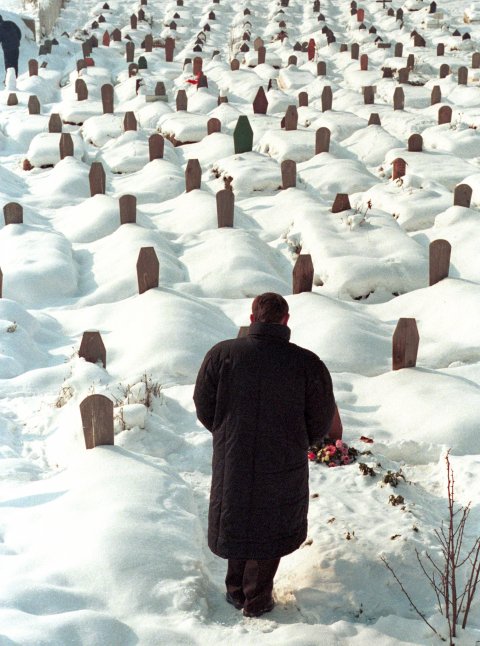
I was a young reporter then, documenting war crimes and crimes against humanity in Bosnia, only three hours by airplane from my home in Paris. Some of the crimes were unthinkable in their brutality: A group of children were killed by a mortar as they built a snowman; a young boy who went outside to play soccer was blinded by an incoming shell. Day after day, we learned of new tragedies, but it made little difference. Bosnia was abandoned.
The war dragged on. Two years after that desperate phone call, in July 1995, Srebrenica fell. In those days, Muslim men and boys there were separated from their mothers, sisters and wives, driven into the woods and hunted down like animals, then slaughtered before being tossed into mass graves. A lucky few survived by pretending to be dead, hiding under bodies.
After the war, under the conditions of the Dayton Peace Accords, the town became part of Republika Srpska, and to this day it is hard to find Muslim families who feel safe there. The women who were raped tried to return to their communities, but they often had to face their rapists on a daily basis—in the street, at the market, in their villages in eastern and central Bosnia. Shockingly, few of those responsible were ever prosecuted for their crimes. Ultimately, more than 100,000 Bosnians died, and thousands more were left homeless, destitute and traumatized by a civil war that the international community did nothing to stop.
The siege of Sarajevo lasted another two years, too. In April 2012, when I returned to commemorate the 20th anniversary of the start of the war, I stood in front of that same presidency building. More than 11,000 red chairs were lined up—one for the soul of every Sarajevan who had been killed during the siege. There were even tiny chairs for children.
From 1996 to 2008, Karadzic lived in hiding in Serbia, posing as an "energy healer." He was protected by acolytes for years before a tip from British and American intelligence led to his capture in Belgrade. In Bosnia, the reaction to his sentencing was mixed. There was outrage among his supporters, who consider him a war hero. His victims felt only despair and a sense of moral failure that such a monster was given such a light sentence. Forty years for the lives of so many? For genocide?
And what has happened to Bosnia since 1995, when the Dayton Peace Accords were signed? Much has been made of Bosnia's ethnic diversity before the war. At the opening of Karadzic's trial, prosecutor Alan Tieger said he would prove he had "harnessed the forces of nationalism, hatred and fear to pursue his vision of an ethnically segregated Bosnia," and directed them "in a campaign to carve out a mono-ethnic state within his multiethnic country."
In that he succeeded, as did Karadzic. Bosnia is now a polarized, sectarian country, riven by corruption and resentment. The children who were born in the rape camps are now in their early 20s. The fighters have returned to mundane jobs. Many of them, oddly enough, are taxi drivers who talk bitterly about the war years. The trial of Karadzic has been hailed as a triumph of international law, but for the victims, his sentencing does not feel like justice. Or at least, it is only partial justice.
Correction | This story originally said Srebrenica became part of Serbia, whereas it became part of Republika Srpska.



